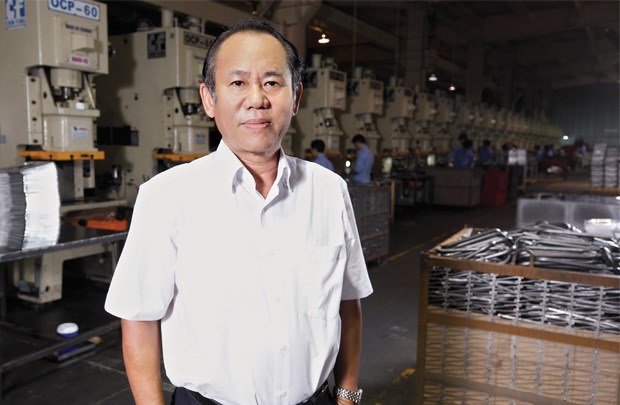Quality, tech help Vietnamese products go global
Nguyen Manh Dung, CEO of Namilux, one of the leading gas stove manufacturers in Vietnam, said his company tied up with a Japanese partner and has adopted Japanese standards in its production for nearly 20 years.
 Nguyen Manh Dung, CEO of Namilux, (Source: doanhnhansaigon.vn)
Nguyen Manh Dung, CEO of Namilux, (Source: doanhnhansaigon.vn)HCM City (VNS/VNA) - Nguyen Manh Dung, CEO of Namilux, one of the leading gas stove manufacturers in Vietnam, said his company tied up with a Japanese partner and has adopted Japanese standards in its production for nearly 20 years.
Now it exports mini gas stoves, heating stoves, grills, and lamps to more than 20 countries, and has consolidated its position and brand name not only in the domestic market but also in fastidious markets, he said.
“Firms cannot stand firm if they do not attach importance to standards and technology.”
In addition to following international standards, “we have pursued solutions to improve technology and automate gas stove production.
“Technology plays an important role in helping NaMilux get such a position in the domestic and export markets.” The company has automated over 70 percent of its production stages, he said.
“We are automating the rest [too]. We will also apply enterprise resource planning (ERP) system to unify the management of the entire NaMilux factory.”
Nguyen Phuoc Hoa, an expert who is compiling the Vietnamese High Quality Products-Global Integration Standards for the non-food sector, said: “Standard certificates are considered the passport for Vietnamese products to be exported. Each market has its own requirements in terms of standards, requiring firms to study the market carefully and achieve the standards required by their target markets.”
Speaking at a conference titled “Which wings to enable Vietnamese goods to enter the world market” in HCM City on February 20, Nguyen Hoang Linh, deputy general director of the Directorate for Standards, Metrology and Quality, said: “According to statistics, in recent years more than 80 percent of the value/volume of international trade transactions has been affected by standards, 84 percent of trade organisations use standards in their export strategies/activities.”
There are more than one million standards (at the international, regional, national, grass-root levels) published and adopted around the world, he said.
“Standards, technical regulations, conformity assessment/procedures may become technical barriers to trade in certain cases.”
Hoa said most international standards target consumer safety, and having standard certification would make buyers to trust product quality.
Besides having good product quality, enterprises also need to have good factory management systems and focus on corporate social responsibility, he said.
“Buyers sometimes come to see how you produce the products, even how you treat garbage.”
According to businesses, Vietnamese goods require standard certification to reach store shelves in foreign markets, and at the same time Vietnamese producers must increase investment in technology to improve their competitiveness.
Vu Kim Hanh, Chairwoman of the High Quality Vietnamese Product Business Association, said: “Depending on the needs of each enterprise and each industry, businesses determine what areas and phases to digitise first.
“The most important thing is enterprises must understand the role and impact of technology.”
Most ASEAN member countries have strategies and policies for practical training and support for small and medium enterprises in digitisation to bolster their competitiveness, she said.
Many Vietnamese firms such as Phu Nhuan Jewelry JSC, Dien Quang Lamp JSC, Pomina Steel, Co May Company, Minh Long I, Vinamit, ABC Bakery and Namilux have invested in digitising their production and trading, and enjoyed fruitful results. But many others, especially small ones, do not have the capacity to do that.
Nguyen Phi Van, Chairwoman of Retail and Franchise Asia and franchise advisor to the Malaysian government, said discussions on how to improve the competitiveness of local firms so that they can compete with foreign players have been going on for a long time.
“But actions by government agencies and enterprises themselves are very slow compared to changes in the market,” she said.
“Integration offers a golden opportunity for businesses to develop but also massacres those who don’t have sufficient capacity to integrate.”
Consumer demand is changing in the global market, with an increase in demand for green products and products that are good for health, she said.
With the boom in technology, interaction between businesses and consumers is quite different compared to the past, and customers nowadays prefer to spend their money on “experiences rather than products,” she said.
“Therefore, if you do not adopt technologies to rebuild your business model for the 21st century, you will find it hard to succeed even in the Vietnamese market, let alone the global market.”-VNS/VNA













